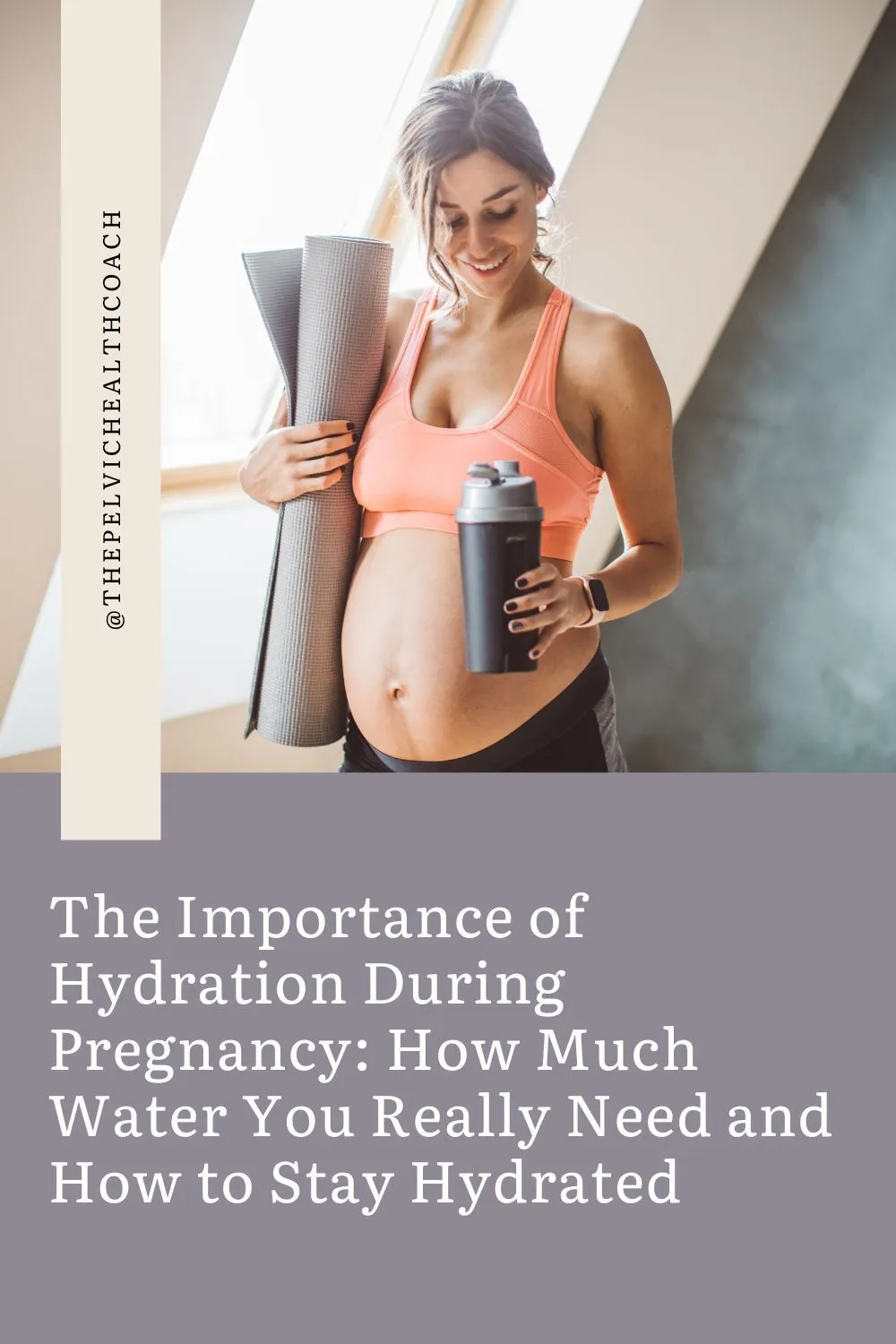The Importance of Hydration During Pregnancy: How Much Water You Really Need and How to Stay Hydrated
As a pelvic health specialist who has seen countless women through their pregnancy journeys, I’ve noticed that one topic often underestimated is hydration. While it may seem simple, staying hydrated during pregnancy is absolutely crucial, not just for your comfort but for the health of your growing baby. So, let’s dive into why hydration matters so much and how you can ensure you’re getting enough water every day.
Why Hydration is Essential During Pregnancy
During pregnancy, your body’s demand for water increases significantly. You’re not just hydrating yourself; you’re also providing the necessary fluids for your baby. Water plays a vital role in forming the amniotic fluid, supporting digestion, and even helping with the absorption of essential nutrients. Dehydration can lead to complications such as headaches, nausea, cramps, and even preterm labor in severe cases.
Hydration is also a key player in maintaining your overall comfort. As your baby grows, you’ll likely experience common discomforts such as swelling (hello, ankles!), constipation, and Braxton Hicks contractions. Keeping hydrated can help minimize these issues, keeping you more comfortable throughout your pregnancy.
The Connection Between Hydration and Baby’s Kick Count
One often overlooked reason to ensure you’re staying well-hydrated during pregnancy is the effect dehydration can have on your baby’s activity levels, particularly their kick count. Kick counts are an important indicator of your baby’s well-being, and decreased fetal movement can be a sign that something is off, including dehydration.
When you’re dehydrated, the volume of amniotic fluid can decrease, which may reduce the space in which your baby moves, potentially leading to fewer noticeable kicks. If you ever notice a reduction in your baby’s movement, one of the first things you should do is drink a large glass of water and then lie down to rest. Often, this simple act can increase your baby’s activity level as hydration is restored.
However, if your baby’s kick count doesn’t improve after rehydrating, it’s important to contact your healthcare provider for further evaluation. Staying hydrated helps ensure that your baby has the optimal environment for movement and growth.
How Much Water Do You Really Need?
The general guideline is to aim for about 8-10 cups (64-80 ounces) of water a day, but your needs may increase during pregnancy. Factors such as your activity level, the climate you live in, and how much you’re sweating all play a role in determining your exact water needs.
A good rule of thumb is to listen to your body. If you’re feeling thirsty, it’s your body’s way of telling you to drink up. Also, keep an eye on the color of your urine – a pale yellow is a good sign that you’re adequately hydrated, while darker shades may indicate that you need to drink more.
The Role of Electrolytes in Hydration
While water is essential, it’s not the only factor in staying properly hydrated—electrolytes play a crucial role too. Electrolytes, such as sodium, potassium, and magnesium, are minerals that help regulate nerve and muscle function, balance the amount of water in your body, and maintain blood pH levels.
During pregnancy, your body’s demand for electrolytes increases. Whether you’re sweating more, experiencing morning sickness, or just working hard to grow a tiny human, keeping your electrolyte levels balanced is key to feeling your best.
Adding Electrolytes to Your Routine:
- Clean and Well-Sourced Electrolytes: Look for clean, well-sourced electrolyte powders or drinks that don’t contain added sugars, artificial flavors, or unnecessary additives. These can be mixed with water to enhance hydration and replenish essential minerals.
- Adrenal Cocktail by Jigsaw Health: One of my favorite ways to ensure proper electrolyte intake is through an adrenal cocktail powder like the one by Jigsaw Health. A good adrenal cocktail powder should include high-quality sea salt and potassium in the correct ratio, along with whole food vitamin C. This combination supports adrenal health and provides the electrolytes your body needs to function optimally.
- Counteracting Dehydration from Caffeine: If you enjoy your daily cup of coffee, consider consuming an electrolyte-rich drink before or just after your coffee. Caffeine has a diuretic effect, which can contribute to dehydration. By adding electrolytes, you can help counteract this effect and keep your body balanced.
Practical Tips for Staying Hydrated
- Carry a Water Bottle Everywhere: Having a water bottle by your side at all times is a simple but effective way to remind yourself to drink regularly. Consider one with measurement markings to help you track your intake throughout the day.
- Set Reminders: If you tend to forget to drink water, set reminders on your phone or use a hydration tracking app. These little nudges can make a big difference.
- Infuse Your Water: If plain water doesn’t excite you, try infusing it with fruits, herbs, or even a splash of your favorite juice. Think cucumber and mint, lemon and ginger, or strawberries and basil – the possibilities are endless and delicious.
- Eat Water-Rich Foods: Remember, it’s not just about what you drink. Many fruits and vegetables have high water content and can contribute to your daily hydration. Watermelon, cucumbers, oranges, and strawberries are great options.
- Start and End Your Day with Water: Make it a habit to drink a glass of water first thing in the morning and before you go to bed. This bookends your day with hydration and helps ensure you’re staying on track.
Signs You’re Not Drinking Enough Water
Even with the best intentions, it can be easy to fall short of your hydration goals, especially when you’re busy and on the go. Here are some signs that you might need to increase your water intake:
- Dry Mouth and Skin: These are classic signs of dehydration. If your lips are chapped or your skin feels dry, it could be a signal to drink more water.
- Fatigue: Dehydration can lead to feelings of tiredness and sluggishness. If you’re feeling unusually fatigued, consider whether you’re drinking enough.
- Headaches: Dehydration is a common trigger for headaches. If you’re prone to headaches, try increasing your water intake and see if it helps.
- Dizziness: Feeling lightheaded or dizzy can be a more severe sign of dehydration and should be addressed quickly.
Hydration Beyond Water
While water is the best hydrator, there are other fluids that can contribute to your overall intake. Herbal teas, coconut water, and even broth-based soups can help keep you hydrated. Just be mindful of caffeinated beverages like coffee and certain teas, as these can have a diuretic effect and may actually contribute to dehydration.
Final Thoughts
Hydration is one of the simplest yet most effective ways to support a healthy pregnancy. By making it a priority, you’re not only taking care of yourself but also providing the best environment for your baby to grow and thrive. Incorporating clean, well-sourced electrolytes into your routine, like those found in an adrenal cocktail powder, can further enhance your hydration and overall well-being. Remember, staying hydrated can also positively impact your baby’s activity levels, ensuring they have the optimal environment to move and grow. So, drink up, and if you’re ever unsure about your hydration needs, don’t hesitate to reach out to your healthcare provider for personalized advice.
At Pinnacle, we’re here to support you every step of the way on your journey to motherhood. Whether it’s through our holistic care approach or simply encouraging you to stay hydrated, we’re committed to helping you achieve a healthy and empowering pregnancy experience.
Disclaimer:
The information provided in this blog post is for educational purposes only and is not intended as a substitute for professional medical advice, diagnosis, or treatment. Always seek the advice of your physician, physical therapist, or other qualified healthcare provider with any questions you may have regarding a medical condition. Never disregard professional medical advice or delay in seeking it because of something you have read on this blog. The content is based on my personal and professional experiences, and while I strive to provide accurate and up-to-date information, healthcare is an evolving field, and individual circumstances may vary. Please consult your healthcare provider before making any changes to your health regimen, particularly if you are pregnant, postpartum, or managing a specific health condition.




